Unit 1 The lion and the mouse(复习课件)-2023-2024学年六年级英语下学期期中核心考点集训
文档属性
| 名称 | Unit 1 The lion and the mouse(复习课件)-2023-2024学年六年级英语下学期期中核心考点集训 |
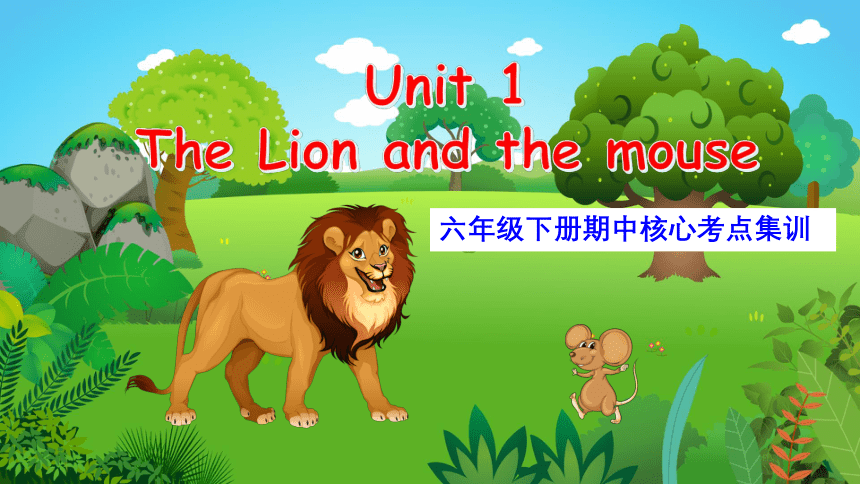
|
|
| 格式 | pptx | ||
| 文件大小 | 8.0MB | ||
| 资源类型 | 试卷 | ||
| 版本资源 | 牛津译林版 | ||
| 科目 | 英语 | ||
| 更新时间 | 2024-04-10 00:00:00 | ||
图片预览

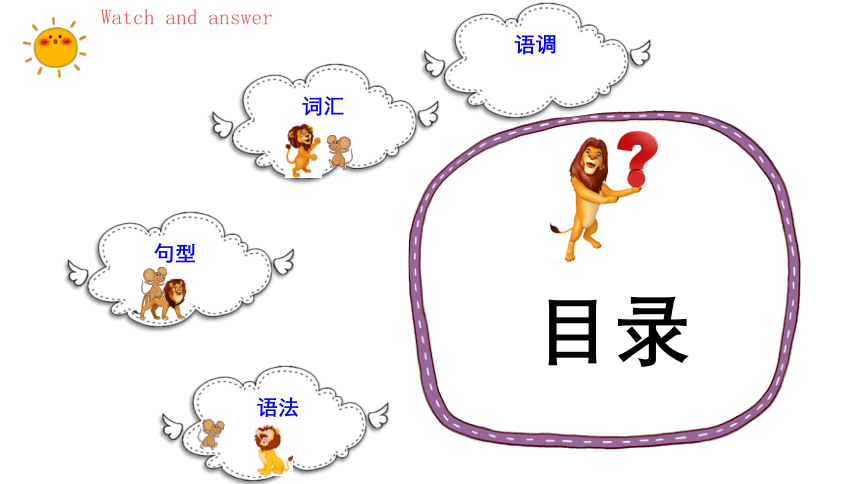
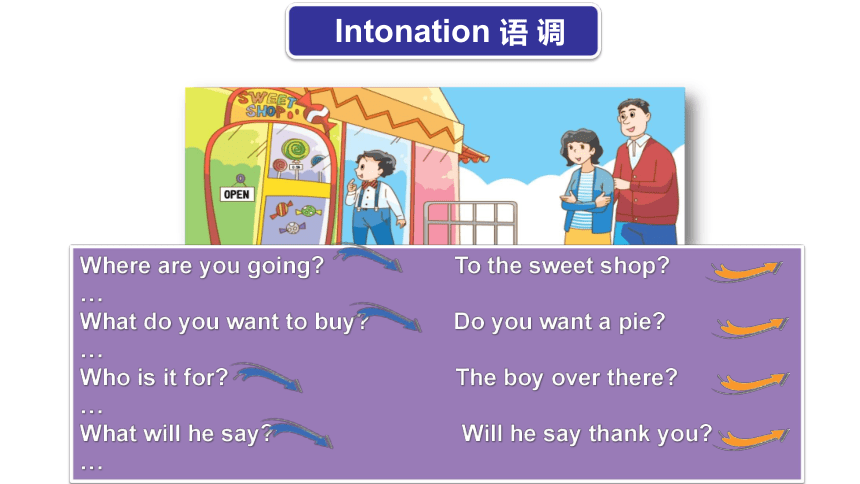
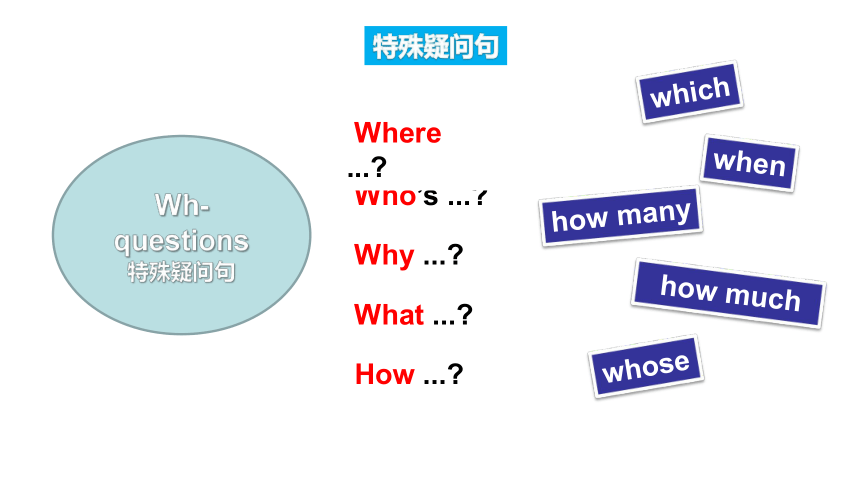
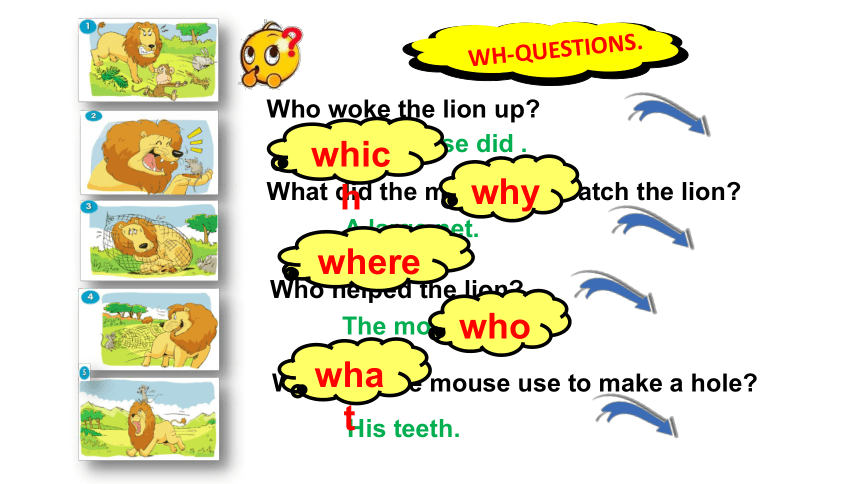
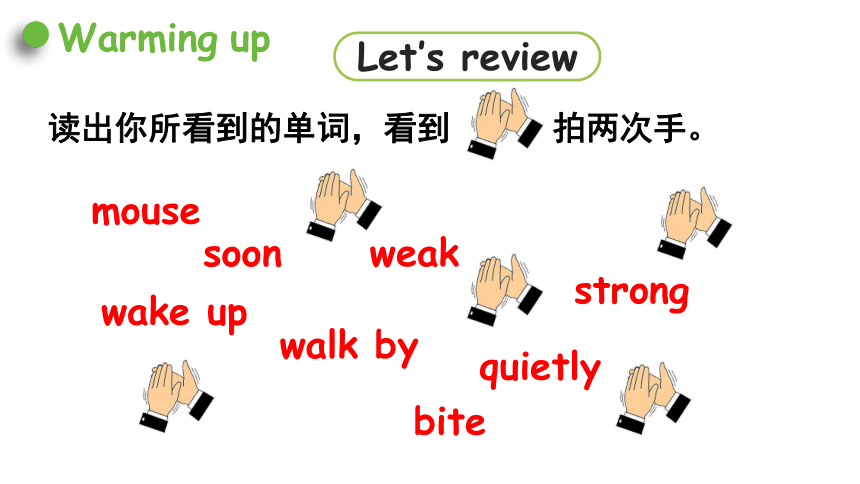
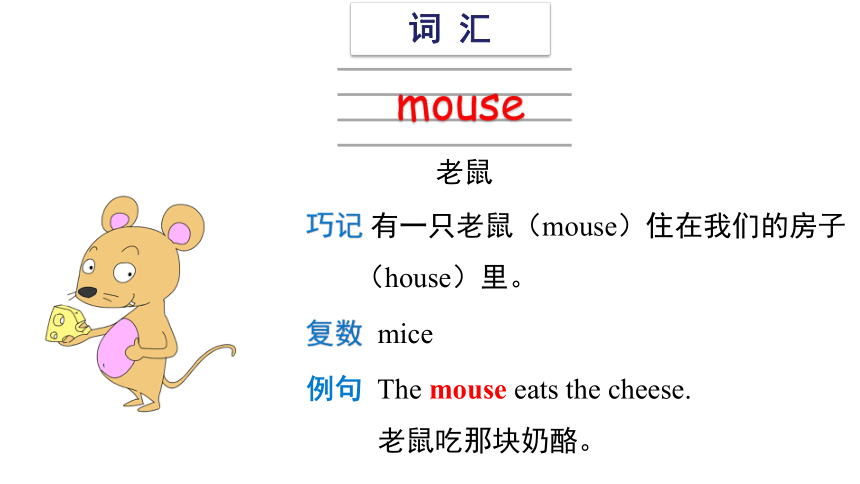
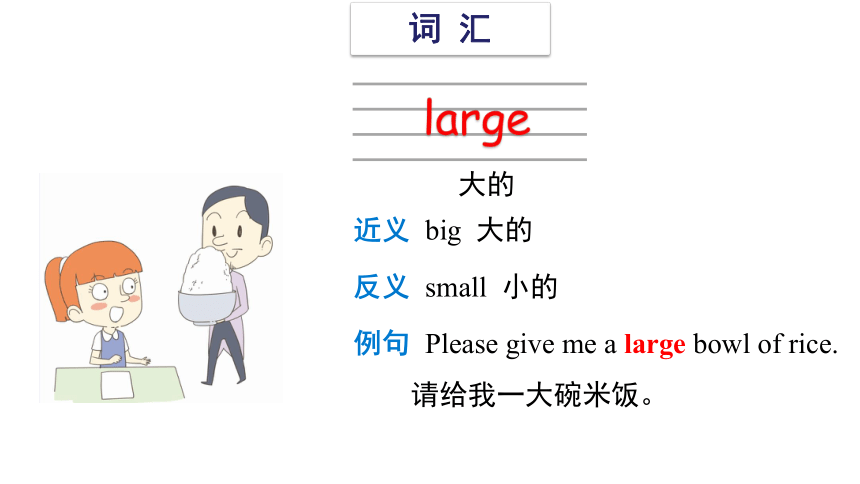
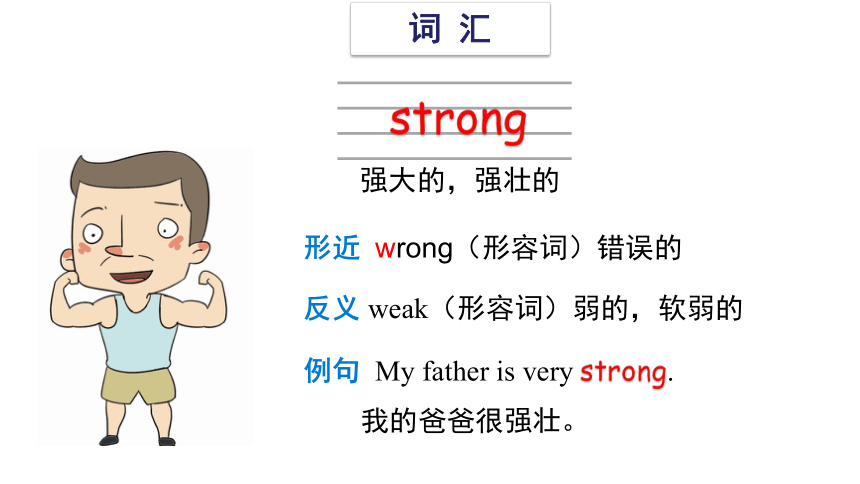
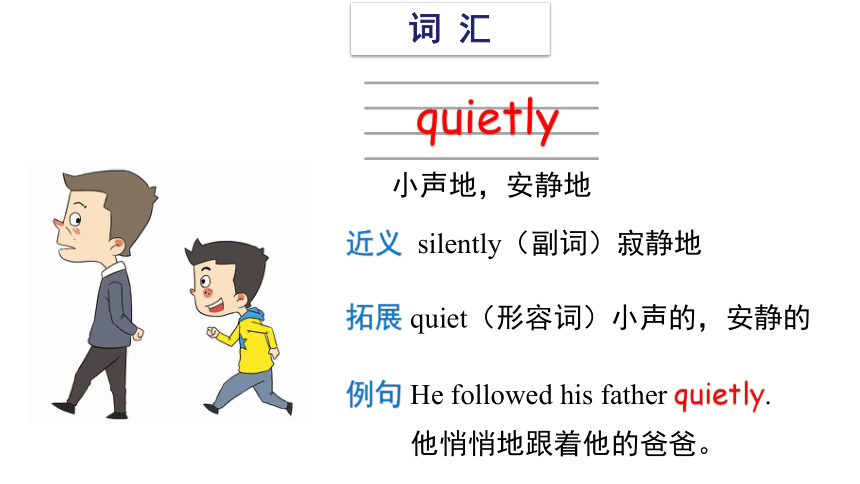
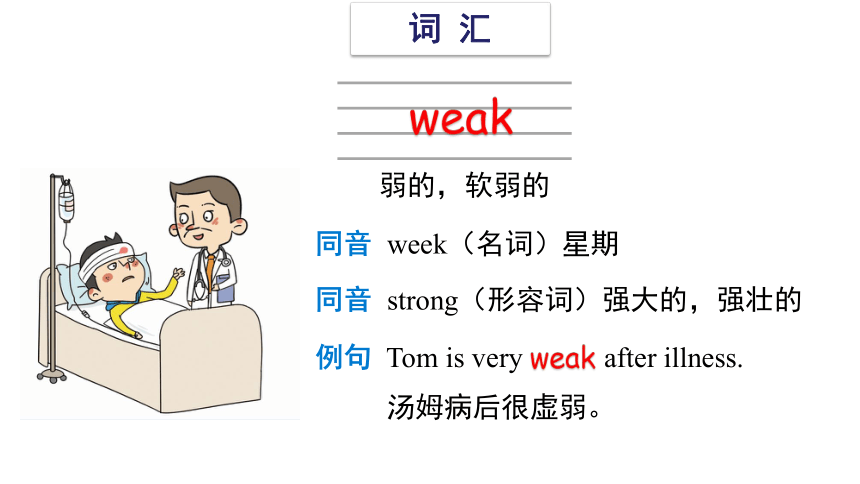
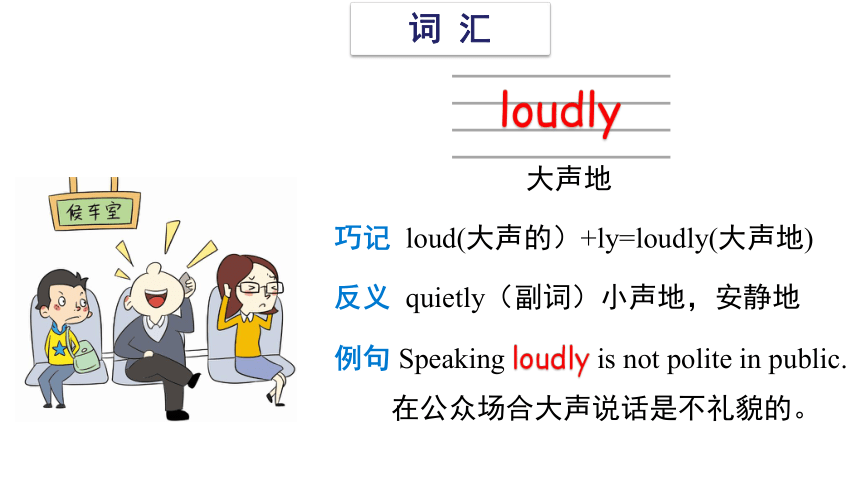
文档简介
(共46张PPT)
Unit 1
The Lion and the mouse
六年级下册期中核心考点集训
词汇
句型
语法
目录
Watch and answer
语调
Intonation 语 调
Where are you going To the sweet shop
…
What do you want to buy Do you want a pie
…
Who is it for The boy over there
…
What will he say Will he say thank you
…
Who’s ...
Where ...
Why ...
What ...
How ...
Wh-questions
特殊疑问句
特殊疑问句
which
when
how many
how much
whose
Who woke the lion up
What did the men use to catch the lion
Who helped the lion
What did the mouse use to make a hole
The mouse did .
A large net.
The mouse did.
His teeth.
WH-QUESTIONS.
who
where
what
which
why
读出你所看到的单词,看到 拍两次手。
mouse
soon
strong
bite
weak
wake up
walk by
quietly
Warming up
Let’s review
mouse
老鼠
例句 The mouse eats the cheese.
老鼠吃那块奶酪。
词 汇
巧记 有一只老鼠(mouse)住在我们的房子
(house)里。
复数 mice
large
大的
近义 big 大的
词 汇
例句 Please give me a large bowl of rice.
请给我一大碗米饭。
反义 small 小的
strong
强大的,强壮的
反义 weak(形容词)弱的,软弱的
词 汇
形近 wrong(形容词)错误的
例句 My father is very strong.
我的爸爸很强壮。
quietly
小声地,安静地
拓展 quiet(形容词)小声的,安静的
词 汇
近义 silently(副词)寂静地
例句 He followed his father quietly.
他悄悄地跟着他的爸爸。
weak
弱的,软弱的
同音 week(名词)星期
词 汇
同音 strong(形容词)强大的,强壮的
例句 Tom is very weak after illness.
汤姆病后很虚弱。
loudly
大声地
词 汇
巧记 loud(大声的)+ly=loudly(大声地)
反义 quietly(副词)小声地,安静地
例句 Speaking loudly is not polite in public.
在公众场合大声说话是不礼貌的。
let...go
释放,放开
联想 let it go 放手吧,随它吧
词 汇
短语 let sb./sth. go 放开某人/某物
例句 Someone let the tiger go.
有人把老虎放出来了。
net
网
联想 Internet(名词)互联网,因特网
词 汇
例句 The fisherman is catching fish with
the net. 渔夫正在用(渔)网捕鱼。
bite
咬
形近 bike(名词)自行车
词 汇
过去式 bit
例句 A dog bit her new dress.
一只狗咬了她的新连衣裙。
sharp
锋利的,尖的
形近 share (动词)分享
词 汇
拓展 sharply(副词)严厉地;急剧地
例句 The knife is too sharp.
这把刀太锋利了。
sadly
难过地,伤心地
巧记 sad(难过的,伤心的)+ly=sadly
(难过地,伤心地)
词 汇
例句 The little boy is crying sadly.
这个小男孩儿正伤心地哭着。
just then
就在那时
联想 just now 刚才,刚刚
词 汇
例句 Just then , Amy found the key.
就在那时,埃米找到了钥匙。
soon
不久,很快
巧记 so(这样)+on(在……上)=soon
词 汇
形近 noon(名词)中午
短语 as soon as 一……就……
例句 It’s my birthday soon. 我的生日快到了。
happily
开心地,高兴地
近义 gladly(副词)高兴地
词 汇
反义 sadly(副词)难过地,伤心地
拓展 happy(形容词)开心的,高兴的
例句 He jumped up happily.
他高兴地跳了起来。
from then on
从那时起
联想 from now on 从现在起
词 汇
例句 From then on , they lived happily.
从那时起,他们幸福地生活着。
短语
1.One day, a mouse walked by and woke the lion up.
2.The lion asked sadly. The mouse said happily.
3.How can you help me How can I get out
4.The next day, two men caught the lion with a large net.
句型
6.Soon, the mouse made a big hole in the net with his teeth.
7.From then on, the lion and the mouse became friends.
8.Billy and Willy cheered for them loudly.
5.The lion could not get out from the net.
句型
Grammar time
The lion asked sadly.
laughed loudly.
The mouse said quietly.
happily.
形容词作表语或作定语修饰名词;副词作状语修饰动词。
Grammar time
excited
excitedly
quiet
quietly
loud
loudly
sad
sadly
happy
happily
知识讲解
副词的用法
副词常用来表示时间、地点、行为或状态特征,一般用来修饰动词、形容词、其他副词或整个句子。形容词变副词遵循以下规则:
知识讲解
1
一般直接在形容词的词尾加-ly
loud 大声的
loudly 大声地
careful 仔细的
carefully 仔细地
知识讲解
2
以辅音字母加 y 结 尾的形容词,先把 y变为 i,再加-ly
terrible 糟糕的
terribly 糟糕地
simple 简单的
simply 简单地
知识讲解
3
以辅音字母加 le 结 尾的形容词,先去掉e,再加-y
angry 生气的
angrily 生气地
heavy 沉重的
heavily 沉重地
知识讲解
4
少数以 e 结尾的形容词要先去掉 e,再加-ly
true 真正的
truly 真正地
whole 完整的
wholly 完整地
知识讲解
5
有些副词与形容词同形
early 早的
early 早地
excited
slow
angry
heavy
early
fast
angrily
heavily
excitedly
fast
slowly
early
Let’s match
一、副词常用修饰动词(除系动词)或形容词
dance happily very good ,
二. 副词在句中的位置
1. 副词修饰动词时通常放在动词之后, 如果动词后接宾语,放在宾语之后。
talk loudly do his homework carefully
2. 程度副词修饰形容词时,放在形容词前面.
too big very cold really nice quite good
三、 系动词 + 形容词
系动词的分类——
Be动词 2. 保持类: keep , stay
3. 表象类 : seem , appear, look
4. 感官类 : feel , smell, sound , taste
5. “变得”类 become ,grow , turn , get , go , come
副词用法
Let’s choose
1.She is so ___, and she does her work ___.
A. careful; careful B. carefully; careful
C. careful; carefully
2.My brother is ___, and he can run ___.
A. tall; fast B.tall; good C. small; slow
C
A
一般过去时
定义:①过去某个时间发生的动作或存在的状态
②过去经常或反复发生的动作。
eg: She was 11 years old last year.
Liu Tao often played football with his friends when
he was young.
一般过去时常用时间状语:
① yesterday,yesterday evening...
② last year,last summer,last Tuesday...
③ two days ago,a week ago...
④ this morning...
⑤ in 2019...
⑥ once(曾经),just now (刚才) ...
一般过去时的结构:动词的过去式
1.过去式的规则变化:
①一般情况:动词词尾加ed listen-listened
②以不发音的e结尾的动词词尾加d live-lived
③以“辅音字母+y”结尾额动词,变y为i,加ed study-studies
④以“辅元辅”结尾的动词,双写结尾字母,再加ed stop-stopped
bite—bit let—let wake—woke
is—was walk—walked
do—did laugh—laughed
see—saw ask—asked
say—said want—wanted
get—got catch—caught
make—made become—became
Let’s review
动词原形—动词过去式
一般过去时的句型变化
1.be动词的一般过去时:
肯定句:be动词的过去式(was, were)
否定句:be动词的过去式(was, were)+ not
疑问句:Be 动词的过去式(was, were)+主语 ...
eg:He was happy yesterday.
He was not happy yesterday.
Was he happy yesterday
2.行为动词的一般过去时:
肯定句:主语 + 行为动词的过去式+其他.
否定句:主语 +didn’t + 动词原形+其他.
疑问句:...did +主语+动词原形 +其他
eg:He watched a football match yesterday.
He didn’t watch a football match yesterday.
Did he watch a football match yesterday
Mike is a ____ (happy/happily) boy. He is ____ (good/well) at PE. He runs very fast. He plays basketball ____ (good/well). He always laughs____ (loud/loudly). Yesterday, he ___ (see/saw) a little girl crying ____ (sad/sadly) beside a bus stop. She couldn’t find her mum. Mike ____ (help/helped) her. Mike felt very ____(happy/happily).
Practice
选择合适的单词,完成句子。
1.quick (副词) ______ 5.fast (副词) ____
2.drink (过去式) ______ 6.fly (过去式) ____
3.angry (副词) ______ 7.true (副词) ____
4.swim (过去式) ______ 8.tell (过去式) ____
quickly
drank
angrily
swam
fast
flew
truly
told
按要求写单词。
Thank You
Unit 1
The Lion and the mouse
六年级下册期中核心考点集训
词汇
句型
语法
目录
Watch and answer
语调
Intonation 语 调
Where are you going To the sweet shop
…
What do you want to buy Do you want a pie
…
Who is it for The boy over there
…
What will he say Will he say thank you
…
Who’s ...
Where ...
Why ...
What ...
How ...
Wh-questions
特殊疑问句
特殊疑问句
which
when
how many
how much
whose
Who woke the lion up
What did the men use to catch the lion
Who helped the lion
What did the mouse use to make a hole
The mouse did .
A large net.
The mouse did.
His teeth.
WH-QUESTIONS.
who
where
what
which
why
读出你所看到的单词,看到 拍两次手。
mouse
soon
strong
bite
weak
wake up
walk by
quietly
Warming up
Let’s review
mouse
老鼠
例句 The mouse eats the cheese.
老鼠吃那块奶酪。
词 汇
巧记 有一只老鼠(mouse)住在我们的房子
(house)里。
复数 mice
large
大的
近义 big 大的
词 汇
例句 Please give me a large bowl of rice.
请给我一大碗米饭。
反义 small 小的
strong
强大的,强壮的
反义 weak(形容词)弱的,软弱的
词 汇
形近 wrong(形容词)错误的
例句 My father is very strong.
我的爸爸很强壮。
quietly
小声地,安静地
拓展 quiet(形容词)小声的,安静的
词 汇
近义 silently(副词)寂静地
例句 He followed his father quietly.
他悄悄地跟着他的爸爸。
weak
弱的,软弱的
同音 week(名词)星期
词 汇
同音 strong(形容词)强大的,强壮的
例句 Tom is very weak after illness.
汤姆病后很虚弱。
loudly
大声地
词 汇
巧记 loud(大声的)+ly=loudly(大声地)
反义 quietly(副词)小声地,安静地
例句 Speaking loudly is not polite in public.
在公众场合大声说话是不礼貌的。
let...go
释放,放开
联想 let it go 放手吧,随它吧
词 汇
短语 let sb./sth. go 放开某人/某物
例句 Someone let the tiger go.
有人把老虎放出来了。
net
网
联想 Internet(名词)互联网,因特网
词 汇
例句 The fisherman is catching fish with
the net. 渔夫正在用(渔)网捕鱼。
bite
咬
形近 bike(名词)自行车
词 汇
过去式 bit
例句 A dog bit her new dress.
一只狗咬了她的新连衣裙。
sharp
锋利的,尖的
形近 share (动词)分享
词 汇
拓展 sharply(副词)严厉地;急剧地
例句 The knife is too sharp.
这把刀太锋利了。
sadly
难过地,伤心地
巧记 sad(难过的,伤心的)+ly=sadly
(难过地,伤心地)
词 汇
例句 The little boy is crying sadly.
这个小男孩儿正伤心地哭着。
just then
就在那时
联想 just now 刚才,刚刚
词 汇
例句 Just then , Amy found the key.
就在那时,埃米找到了钥匙。
soon
不久,很快
巧记 so(这样)+on(在……上)=soon
词 汇
形近 noon(名词)中午
短语 as soon as 一……就……
例句 It’s my birthday soon. 我的生日快到了。
happily
开心地,高兴地
近义 gladly(副词)高兴地
词 汇
反义 sadly(副词)难过地,伤心地
拓展 happy(形容词)开心的,高兴的
例句 He jumped up happily.
他高兴地跳了起来。
from then on
从那时起
联想 from now on 从现在起
词 汇
例句 From then on , they lived happily.
从那时起,他们幸福地生活着。
短语
1.One day, a mouse walked by and woke the lion up.
2.The lion asked sadly. The mouse said happily.
3.How can you help me How can I get out
4.The next day, two men caught the lion with a large net.
句型
6.Soon, the mouse made a big hole in the net with his teeth.
7.From then on, the lion and the mouse became friends.
8.Billy and Willy cheered for them loudly.
5.The lion could not get out from the net.
句型
Grammar time
The lion asked sadly.
laughed loudly.
The mouse said quietly.
happily.
形容词作表语或作定语修饰名词;副词作状语修饰动词。
Grammar time
excited
excitedly
quiet
quietly
loud
loudly
sad
sadly
happy
happily
知识讲解
副词的用法
副词常用来表示时间、地点、行为或状态特征,一般用来修饰动词、形容词、其他副词或整个句子。形容词变副词遵循以下规则:
知识讲解
1
一般直接在形容词的词尾加-ly
loud 大声的
loudly 大声地
careful 仔细的
carefully 仔细地
知识讲解
2
以辅音字母加 y 结 尾的形容词,先把 y变为 i,再加-ly
terrible 糟糕的
terribly 糟糕地
simple 简单的
simply 简单地
知识讲解
3
以辅音字母加 le 结 尾的形容词,先去掉e,再加-y
angry 生气的
angrily 生气地
heavy 沉重的
heavily 沉重地
知识讲解
4
少数以 e 结尾的形容词要先去掉 e,再加-ly
true 真正的
truly 真正地
whole 完整的
wholly 完整地
知识讲解
5
有些副词与形容词同形
early 早的
early 早地
excited
slow
angry
heavy
early
fast
angrily
heavily
excitedly
fast
slowly
early
Let’s match
一、副词常用修饰动词(除系动词)或形容词
dance happily very good ,
二. 副词在句中的位置
1. 副词修饰动词时通常放在动词之后, 如果动词后接宾语,放在宾语之后。
talk loudly do his homework carefully
2. 程度副词修饰形容词时,放在形容词前面.
too big very cold really nice quite good
三、 系动词 + 形容词
系动词的分类——
Be动词 2. 保持类: keep , stay
3. 表象类 : seem , appear, look
4. 感官类 : feel , smell, sound , taste
5. “变得”类 become ,grow , turn , get , go , come
副词用法
Let’s choose
1.She is so ___, and she does her work ___.
A. careful; careful B. carefully; careful
C. careful; carefully
2.My brother is ___, and he can run ___.
A. tall; fast B.tall; good C. small; slow
C
A
一般过去时
定义:①过去某个时间发生的动作或存在的状态
②过去经常或反复发生的动作。
eg: She was 11 years old last year.
Liu Tao often played football with his friends when
he was young.
一般过去时常用时间状语:
① yesterday,yesterday evening...
② last year,last summer,last Tuesday...
③ two days ago,a week ago...
④ this morning...
⑤ in 2019...
⑥ once(曾经),just now (刚才) ...
一般过去时的结构:动词的过去式
1.过去式的规则变化:
①一般情况:动词词尾加ed listen-listened
②以不发音的e结尾的动词词尾加d live-lived
③以“辅音字母+y”结尾额动词,变y为i,加ed study-studies
④以“辅元辅”结尾的动词,双写结尾字母,再加ed stop-stopped
bite—bit let—let wake—woke
is—was walk—walked
do—did laugh—laughed
see—saw ask—asked
say—said want—wanted
get—got catch—caught
make—made become—became
Let’s review
动词原形—动词过去式
一般过去时的句型变化
1.be动词的一般过去时:
肯定句:be动词的过去式(was, were)
否定句:be动词的过去式(was, were)+ not
疑问句:Be 动词的过去式(was, were)+主语 ...
eg:He was happy yesterday.
He was not happy yesterday.
Was he happy yesterday
2.行为动词的一般过去时:
肯定句:主语 + 行为动词的过去式+其他.
否定句:主语 +didn’t + 动词原形+其他.
疑问句:...did +主语+动词原形 +其他
eg:He watched a football match yesterday.
He didn’t watch a football match yesterday.
Did he watch a football match yesterday
Mike is a ____ (happy/happily) boy. He is ____ (good/well) at PE. He runs very fast. He plays basketball ____ (good/well). He always laughs____ (loud/loudly). Yesterday, he ___ (see/saw) a little girl crying ____ (sad/sadly) beside a bus stop. She couldn’t find her mum. Mike ____ (help/helped) her. Mike felt very ____(happy/happily).
Practice
选择合适的单词,完成句子。
1.quick (副词) ______ 5.fast (副词) ____
2.drink (过去式) ______ 6.fly (过去式) ____
3.angry (副词) ______ 7.true (副词) ____
4.swim (过去式) ______ 8.tell (过去式) ____
quickly
drank
angrily
swam
fast
flew
truly
told
按要求写单词。
Thank You
